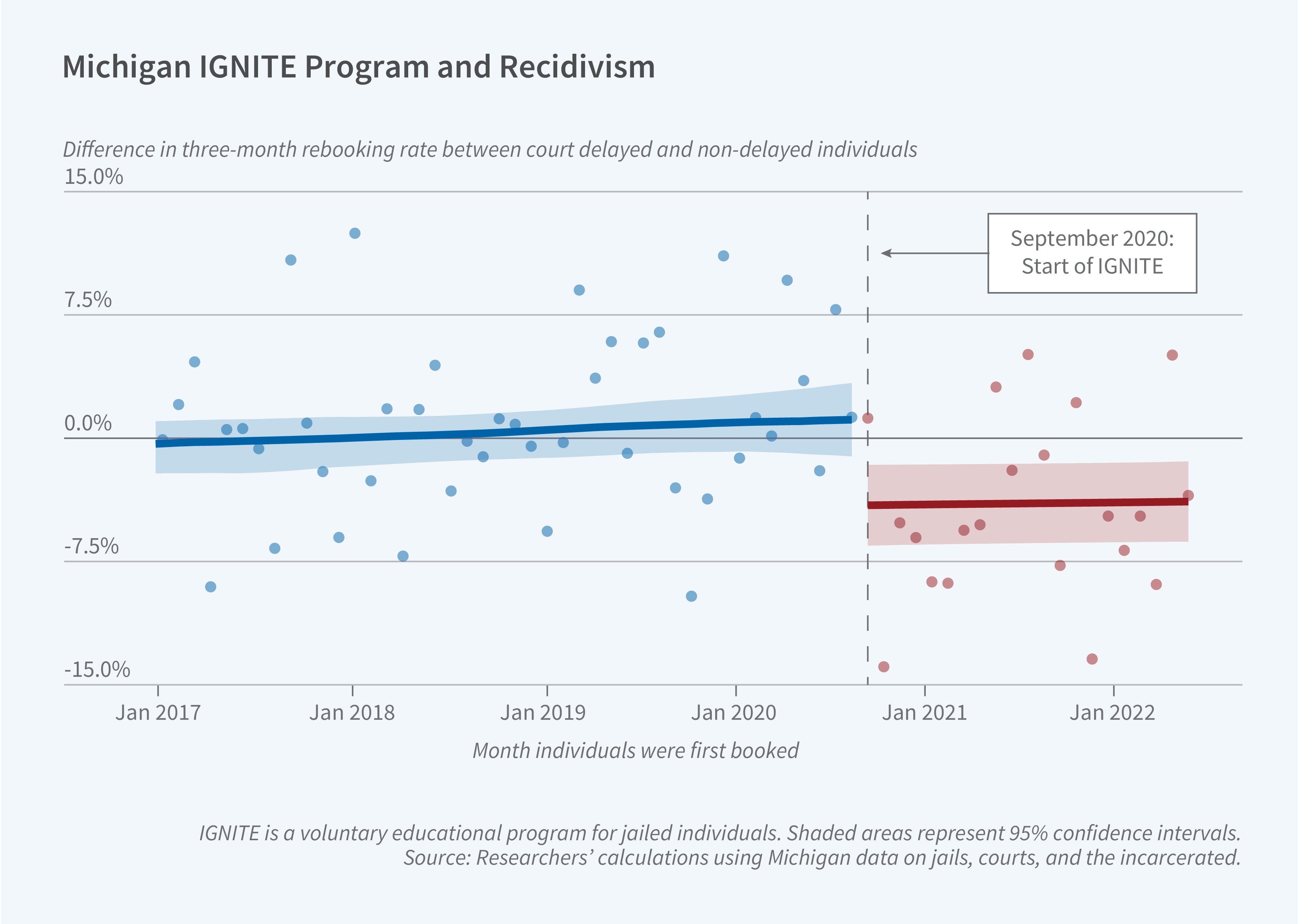Reducing Inmate Misconduct and Recidivism

Within-jail misconduct and recidivism rates upon release were significantly reduced when jailed individuals had access to a free education and training program, Marcella Alsan, Arkey M. Barnett, Peter Hull, and Crystal Yang find in “Something Works” in US Jails: Misconduct and Recidivism Effects of the IGNITE Program (NBER Working Paper 32282).
The researchers study the Inmate Growth Naturally and Intentionally Through Education (IGNITE) program in Flint, Michigan. The program offers tailored educational courses and training to all jailed individuals for two hours a day, five days a week. Courses include basic literacy, GED test preparation, classes for college credit, and training in food handling, commercial driving, masonry, and welding. The program is low cost, largely using existing county resources and staff. Participation is optional, but take-up is encouraged by program participants having access to tablets which they may use to view approved entertainment and games during free time. Program data suggest around 90 percent of inmates opt in.
To study the effects of IGNITE, the researchers construct a database of approximately 23,500 jail stays from January 2016 to May 2022. They combine information from the county’s Jail Management System and District and Circuit Court Registers of Actions to create both a court interaction timeline and a behavioral profile for each jailed individual. Using delays in court appointments as a random source of variation in an individual’s jail time, they compare misconduct and recidivism effects before and after the launch of the IGNITE program in September 2020.
They find that each additional month of access to the IGNITE program was associated with 0.15 fewer incidents of major misconduct per week and a 9 percentage point fall in the likelihood of rearrest and re-jailing within three months — both amounting to around a 25 percent reduction. The recidivism reduction increases over time, with a 17 percentage point (19 percent) decline after one year, and the improvements are concentrated among individuals with the highest risk of rearrest.
The researchers discover that 90 percent of the jailed population spent four months or less in the facility, with an average stay of six weeks. Around 40 percent of those who were jailed experienced a court-related delay, and those delays added an average of two weeks to their incarceration. In the full data sample, 18 percent of the inmates were rearrested and re-incarcerated within three months of release, though those responsive to court delays had much higher recidivism rates.
Prior to the launch of the IGNITE program, court delays were associated with an uptick in individual misconduct and had no effect on recidivism. In contrast, after the program began, court delays were instead associated with reduced misconduct rates and significant reductions in three-month and one-year recidivism.
The researchers suggest two potential explanations for the significant drops in misconduct and recidivism. One is the tangible improvement in literacy and numeracy skills. Pre- and post-training assessments suggest that program participants gained, on average, a full grade level in both math and reading — a significant change for such a short time period. The other, based on surveys of the local community and jail staff, is that the program ushered in a significant cultural shift among jailed individuals, jail staff, and the broader community. Surveys found that jailed individuals and their families reported better perceptions of law enforcement after participating in the program, and that jail staff reported better perceptions of the ability of educational programs to help rehabilitate incarcerated individuals.
—Emma Salomon
The researchers gratefully acknowledge funding from Arnold Ventures.


